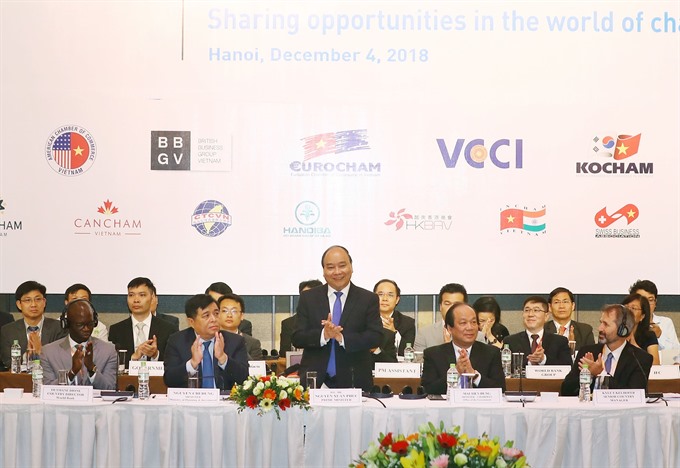If enterprises and nations do not see their own strengths and ultilise their competive advantges, they will find it difficult to develop sustainably and thrive in the future. Prime Minister Nguyen Xuan Phuc made the statement during the Viet Nam Business Forum (VBF) 2018 held in Ha Noi on Tuesday.

If enterprises and nations did not see their own strengths and ultilise their competitive advantages, they would find it difficult to develop sustainably and thrive in the future.
Prime Minister Nguyen Xuan Phuc made the statement during the Viet Nam Business Forum (VBF) 2018 held in Ha Noi on Tuesday, with discussions focusing on the theme of “sharing opportunities in the world of changing trade”.
“Each country and enterprise does not necessarily have to be the No 1 country or the No 1 enterprise, they need to create differences and added value in what they are doing,” Phuc told the forum.
“Although the Fourth Industrial Revolution, the digital economy and technological advancements are the decisive factors creating the trends for the development of mankind this century, the cultural value, national identity and longevity are the things that will create the differences and base for us to be stronger.”
Viet Nam considers economic integration a motivation, a means and a measure to promote reform and to push economic development and create sustainable poverty reduction.
“16 FTAs have been already signed or are being signed, which shows that Viet Nam wants to boost trade liberalisation and the global integration process,” Phuc said.
The Vietnamese business environment has continued to improve. Viet Nam ranked 77th out of 140 countries in the latest Global Competitiveness Report released by the World Economic Forum (WEF). The country also jumped two positions to reach 45th on the Global Innovation Index (GII) 2018 released by the World Intellectual Property Organisation.
This result showed the business community had strong belief in the Vietnamese economy, Phuc said.
Viet Nam had become a major factory for the world and was a very important place for many multinational corporations to provide services, goods and commodities globally. The presence of many international companies like Samsung, Intel, Canon, Toyota, Honda, Nike, Vina Capital and thousands of other FDI companies was evidence of the quality of the business environment and prospects for growth in Viet Nam.
There were more than 27,000 existing FDI projects in Viet Nam with total registered capital of US$335 billion, more than $188 billion of which had been disbursed.
The development of many private economic corporations in Viet Nam proved the business environment was favourable and could nourish large-scale enterprises that were highly competitive globally and were comparative partners of multinational corporations. Many large corporations of Viet Nam were now members of world economic forums such as BRG, T & T, Hoa Phat, Viettel, Vietcombank and Vietjet Air, Phuc said.
Tomaso Andreatta, co-chairman of the VBF Consortium, hailed the positive changes the Vietnamese Government had made to create a stable business environment and encourage start-ups, citing the promulgation of Resolution No 19 on improving the business environment and national competitiveness and Resolution No 35 on supporting and developing businesses by 2020.
He said the business community acknowledged and appreciated the efforts made by ministries, sectors and localities in reducing business and investment conditions, reforming specialised inspections, and simplifying administrative procedures.
In the context of rapidly changing trade, the US-China trade tension may bring about benefits for Vietnamese enterprises, he said, advising Viet Nam to seek ways to take advantage of this opportunity to maintain its economic growth.
Sharing the same view, Chairman of the American Chamber of Commerce (Amcham) in Ha Noi Michael Kelly cited statistics from a recent survey on US enterprises in China as saying that one third of the respondents had removed or were considering the removal of their production factories to other countries.
Meanwhile, half of foreign enterprises from other countries were considering plans to move out of China, and Southeast Asia was considered their best choice. This was a big opportunity for Viet Nam, he said. However, it was not all good to draw a lot of investment capital into the country if foreign-invested enterprises, which accounted for over 70 percent of Viet Nam’s export value, decided to leave the country, he noted.
That is why businesses needed to see continuous and visible progress of issues discussed during this VBF, he said, proposing ineffective administrative procedures be controlled, and the legal framework and taxation be stabilised.
Chairman of the Vietnam Chamber of Commerce and Industry Vu Tien Loc, who is also co-chairman of the VBF Consortium, stressed the need for Viet Nam to step up IT application in all fields, citing that the country climbed 81 places in ease of paying taxes in the World Bank’s Doing Business 2019 thanks to the sector’s expanded IT application.
Minister of Planning and Investment Nguyen Chi Dung told the forum that the Vietnamese Government and ministries and sectors would exert more efforts to implement socio-economic development goals, improve the business and investment climate, increase national competitiveness, step up innovations and start-ups, and attract foreign investment.
The country would also focus on boosting public-private partnerships in infrastructure, and improving education and human resources in the digital era, he added. — VNS





